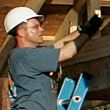Habitat for Humanity rebuilding Gulf Coast
Nearly 18 months after storms, recovery work continues to help low-income families

ATLANTA — Nearly 18 months after Hurricane Katrina swept over the Gulf Coast, Habitat for Humanity is closing in on its initial 1,000-house goal to help low-income families displaced by the storm.
To date, more than 700 homes have been built or are under construction with plans to meet the organization’s goal of having its first 1,000 houses completed or under construction by mid-summer. Habitat plans to continue building once the first 1,000 homes are completed.
Habitat for Humanity has already begun to acquire land and plan for the next 1,000 homes, which will help ensure that local affiliates will be able to deliver affordable houses to qualifying low-income families whose homes were destroyed or severely damaged during the 2005 hurricane season.
“I am proud of the exceptional work that dedicated Habitat for Humanity affiliates, volunteers, supporters and employees are doing in the Gulf Coast recovery,” said Jonathan Reckford, CEO of Habitat for Humanity International. “The 2005 hurricanes are memorable not only for the shocking devastation they caused but also for the shocking poverty they revealed. Through the homes being built today, Habitat will make a difference in the lives of low-income, hurricane-affected families now and for generations to come.”
“Operation Home Delivery (OHD),” Habitat for Humanity’s hurricane response program, was put in place immediately after Hurricane Katrina and then expanded after Hurricane Rita, to help low-income families in Louisiana, Mississippi, Texas and Alabama build permanent housing. Construction of the first Habitat OHD house began in early October 2005, just six weeks after Katrina hit. Work on the 500th Habitat OHD home began in November 2006. Work on House No. 700 began in late January.
“We currently are starting construction on more than 57 homes per month in a region where Habitat affiliates historically had built 57 homes per year,” said Ken Meinert, senior vice president of Operation Home Delivery and the U.S./Canada Area office for Habitat for Humanity International. “We are gratified by those numbers, but the job is far, far from done. We will be building in the region for many years to come.”
Habitat’s three goals for the effort are being met, Meinert said. The goals, set immediately after the hurricanes struck, included helping Habitat affiliates restore service in affected areas, partnering with other organizations to address the complex housing need and building simple, decent homes in partnership with low-income, hurricane-affected families.
“Many of our affiliates in the region were directly impacted by the storm,” Meinert said. “Some lost offices, tools, warehouses, supplies, virtually everything. And their staff members and volunteers were likewise affected. Many of them lost their homes, too. Today, affiliates’ ability to build not only has been restored, but greatly enhanced.
“In fact, some affiliates are building far more houses this year alone than they had built in their previous existence. That has been made possible by help from Operation Home Delivery — and the work of more than 50,000 Habitat volunteers who have come from around the country to help for periods ranging from a few days to many months.”
Habitat for Humanity is meeting its partnership goal as well, Meinert said.
Habitat partnered with Church World Service to help fund the repair of 500 homes for low-income families and with The Salvation Army to increase building capacity, provide housing for volunteers, and make homes along the Gulf Coast more affordable. Lutheran Social Services and other Katrina Aid Today consortium members are also actively engaged in helping families find appropriate housing solutions, including Habitat homes. Habitat volunteers have also helped remove debris and clean thousands of homes in preparation for their rehabilitation.
Habitat for Humanity has spent nearly half of the about $128 million in contributions received to date for its hurricane recovery work. About 90 cents of every dollar has gone directly to program costs, including land acquisition, development and construction materials.
“We’re not a disaster relief or first-responder organization, and house-building isn’t done overnight,” said Meinert. “We were at work in the Gulf Coast communities before the hurricanes hit and we will be there as long as there is a need and we have the resources to help. Prudent spending on land and materials will make our donors’ dollars go further, and eventually will result in more houses.”
Meinert said Habitat for Humanity’s current funding will pay for at least 2,000 new homes in the region.
The current pace of Operation Home Delivery construction requires at least 1,000 volunteers per week. Volunteers can register and donations can be made online at www.habitat.org or by calling 1-800-Habitat (422-4828).
Fine Homebuilding Recommended Products
Fine Homebuilding receives a commission for items purchased through links on this site, including Amazon Associates and other affiliate advertising programs.

Handy Heat Gun

Reliable Crimp Connectors

Affordable IR Camera


















